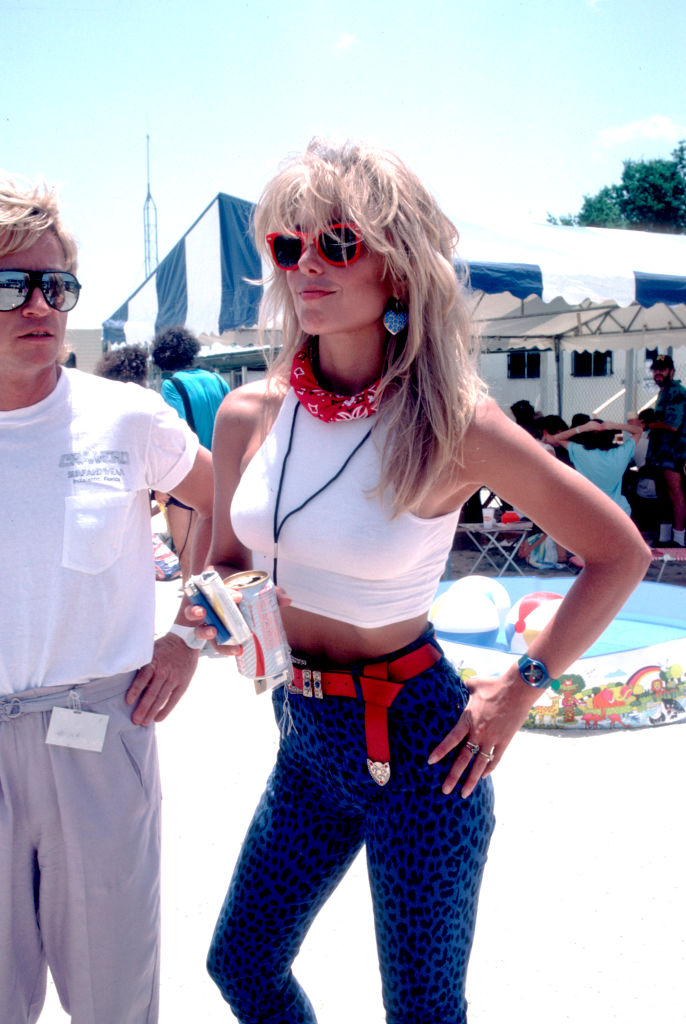Heather Thomas, forever known to fans of The Fall Guy as the gutsy Jody Banks, recently marked her 66th birthday, a milestone that reflects a life marked by transformation, resilience, and growth. Once seen as Hollywood’s next big star, her life took some surprising twists, and her story is now one of overcoming adversity.
For Thomas, a pivotal moment came when she raced to a hospital, fearing the worst for her father, only to find her family’s concern was actually centered on her own well-being. Surrounded by loved ones, she was urged to confront a battle with addiction that had quietly been affecting her career and health. At that time, she was just 28, and her future looked uncertain.

Heather’s charisma and natural talent were undeniable, drawing early comparisons to Farrah Fawcett and Heather Locklear. By 14, she was already hosting Talking with a Giant on NBC, conducting interviews with celebrities alongside her peers. Later, her drive led her to UCLA, where she studied theater and film, determined to build a career as a versatile talent. In 1981, she landed the role that would make her famous—Jody Banks in The Fall Guy—where her blend of beauty and boldness captured the attention of viewers and made her a household name.
Yet, Thomas faced the double-edged sword of fame. The “sex symbol” image was tough to shake, and in an interview, she admitted that this label wasn’t something she felt comfortable with. “People expected me to be the blonde bombshell, but it wasn’t really me,” she shared. This pressure, combined with Hollywood’s demands, led her down a path of substance use that actually began long before her acting days.
Thomas first encountered drugs in sixth grade as a way to cope with academic stress. “I was using acid and getting straight A’s,” she once revealed. By college, her drug use escalated to cocaine, a habit that only intensified when she began filming The Fall Guy in 1981. Pressured to maintain her image, she also started taking diuretics to keep her weight down, which left her drained and pushed her to use even more cocaine for energy.
Initially, Thomas justified her drug use, believing she was in control. Although she never used on set, the toll on her health became clear. Her weight dropped significantly, and she often drifted in and out of exhaustion, describing it as a series of “minicomas.”

The breaking point came when she fainted in front of her co-star Lee Majors. Concerned, Majors reached out to her mother, who visited the set under the pretense of a family emergency. After wrapping up the show’s final scenes, Thomas’ family rallied around her, encouraging her to check into a detox program.
Thomas later reflected that this moment felt like a much-needed relief. When she arrived at detox, doctors found she had pneumonia and swollen kidneys. “I needed to get off this roller coaster,” she said, grateful for her family’s intervention, which likely saved her life.
Committed to recovery, Thomas found strength in surrounding herself with supportive people, including Allan Rosenthal, a co-founder of Cocaine Anonymous, whom she later married, though they divorced in 1986. Unfortunately, that year also brought more hardship when she was struck by a car, leaving her with serious leg injuries that required surgery.
Following her recovery, Thomas returned to acting in smaller roles, with appearances in films like Cyclone (1987) and Red Blooded American Girl (1990). The 1990s marked a turning point in her life. She married entertainment attorney Skip Brittenham in 1992, later welcoming their daughter, India Rose, in 2000. She also embraced her role as stepmother to Brittenham’s daughters, Kristina and Shauna.
In time, Thomas decided to step away from acting, not due to lack of roles but because of constant invasions of privacy. Stalkers often trespassed on her property, and as a mother, she chose to protect her family, focusing instead on writing.
Today, Thomas is a passionate advocate, lending her voice to causes she cares about, including the Amazon Conservation Team and the Rape Foundation. Proudly calling herself a feminist, she views her journey as a testament to strength and self-acceptance. “I realized as I got older that I wanted to live life on my terms,” she shared. To her, feminism is about embracing her true self, free from shame or compromise.

While Heather Thomas may not have returned to the limelight, she has built a life of purpose, driven by her dedication to helping others and her family. Fans will always cherish her as Jody Banks from The Fall Guy, and her story of resilience remains an inspiration.
What do you think of Heather Thomas’ inspiring journey of recovery and reinvention?
